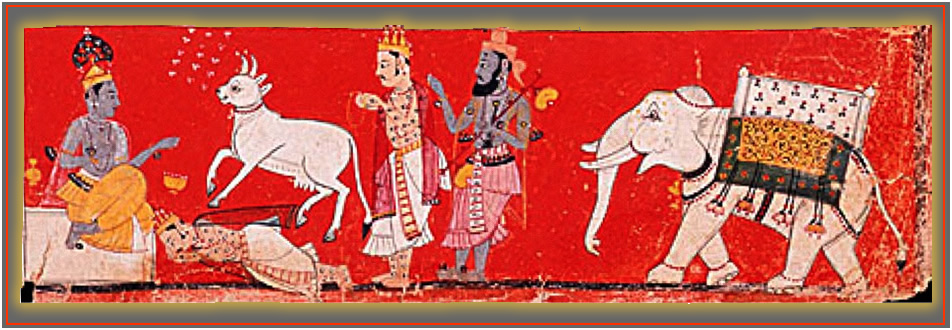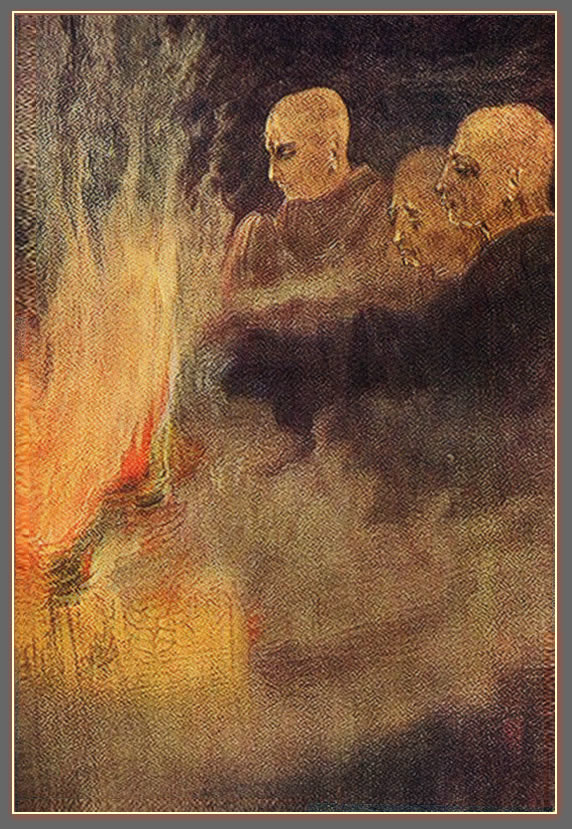Chapter 31: The Ascension of Lord Krishna

(1)
S'rî S'uka said: 'Then Brahmâ with
his consort Bhavânî arrived there, along with S'iva and the
demigods led by Indra and the sages with the lords of the people. (2-3) The forefathers, the perfected and divine
singers, the scientists and the great egos, the venerable, the treasure
keepers and the wild men, the ones of superpower and the dancing girls
of heaven and all the ones of Garuda [the dvijâs] desirous to witness the passing away of the
Supreme Lord, eagerly chanted and praised the birth and activities of S'auri. (4)
They, crowding the sky in a great number of vimânas, o King, joined in transcendental devotion
showering flowers. (5) The Supreme
Lord seeing the great father and his powerful expansions before Him,
fixed His consciousness within Himself, the Almighty One, and closed
His lotus eyes. (6) Without
burning in a mystic trance the object auspicious to all trance and
meditation, viz. His body that is most attractive in all the worlds, He
entered His own abode [compare 4.4].

(7)
And while in heaven kettledrums resounded and
flowers fell from the sky, He was, as He left the earth, followed by
Truth, Righteousness, Constancy, Fame and Beauty [see also 10.39: 53-55]. (8) The demigods and others headed by
Brahmâ, not [quite] knowing what Krishna had done, didn't all see
Him entering His abode, but those who did were most amazed. (9) Just as mortals cannot ascertain the path
lightning describes in the sky as it finds its way through the clouds,
the gods likewise couldn't trace the path of Krishna. (10) But Brahmâ, S'iva and the others
witnessing, in astonishment glorified the yogic power of the Lord,
after which each of them returned to his own world. (11) O King, you should understand that the
appearance, the actions of His illusory potency, and the disappearance
of the Supreme One, just as it happens with normal embodied beings,
constitutes a performance. It is a show in which He just like an actor
by means of Himself sets in motion this universe by entering it, acting
in it and in the end winding it up. After having ceased He then remains
in the greatness of the Supreme Self. (12)
He who brought His guru's son in his selfsame body back after he had
been taken to the world of Yamarâja [10.45], He who also offered protection against the
superior weapon that burned you [1.12]; He who even conquered S'iva, who is the
death of the agents of death [10.63],
why
would
He,
who brought the deerhunter [Jarâ] body and all to
the spiritual world, be incapable of preserving Himself? (13) Despite of the fact that He as the One
Possessing Unlimited Potencies constitutes the exclusive cause of the
maintenance, creation and annihilation of all created beings, He did
not desire to keep His physical frame here in the mortal world. Why
would He, who is the destination for those who fixed themselves upon
Him, keep up appearances [see also 3.2:
10-11]? (14) Anyone who, rising early in the morning,
with care glorifies this supreme destination of Krishna, will with the
devotion undoubtedly reach that unsurpassable destination [see also
B.G. 8: 6].
(12)
He who brought His guru's son in his selfsame body back after he had
been taken to the world of Yamarâja [10.45], He who also offered protection against the
superior weapon that burned you [1.12]; He who even conquered S'iva, who is the
death of the agents of death [10.63],
why
would
He,
who brought the deerhunter [Jarâ] body and all to
the spiritual world, be incapable of preserving Himself? (13) Despite of the fact that He as the One
Possessing Unlimited Potencies constitutes the exclusive cause of the
maintenance, creation and annihilation of all created beings, He did
not desire to keep His physical frame here in the mortal world. Why
would He, who is the destination for those who fixed themselves upon
Him, keep up appearances [see also 3.2:
10-11]? (14) Anyone who, rising early in the morning,
with care glorifies this supreme destination of Krishna, will with the
devotion undoubtedly reach that unsurpassable destination [see also
B.G. 8: 6].
(15) Dâruka deprived of Krishna arriving in Dvârakâ, wet with his tears the feet of Vasudeva and Ugrasena he fell down to. (16-17) He related the destruction of the entirety of the Vrishnis, o ruler of man, and hearing that the people, with their hearts full of sorrow, were rendered senseless. They, overwhelmed by the separation from Krishna, struck their faces, and quickly went to the place where their relatives were laying lifeless. (18) When Devakî, Rohinî and Vasudeva thereupon couldn't find their sons, they pained in tears lost their consciousness. (19) Tormented by being separated from the Supreme Lord they gave up their lives on the spot. Embracing their [dead] husbands my dearest, the wives climbed upon the funeral pyre. (20) The same way the wives of Balarâma embraced His body and entered the fire, the wives of Vasudeva joined his body in the fire and the Lord His daughters-in-law to Pradyumna and the others stepped into the fire. Also the wives of Krishna led by Rukminî, His first queen, fully absorbed in Him followed that course. (21) Arjuna distressed because of his separation from Krishna, his dear friend, consoled himself with the transcendental words of Krishna's song [like 2: 11-12 , 2: 20-21, 2: 27, 4: 7, 4: 6, 7: 25 and 14: 27 of the Bhagavad Gîtâ]. (22) As is prescribed Arjuna saw to it that for the relatives who had died and who had no remaining family members, the funeral rites were executed in order of the seniority of the deceased. (23) Dvârakâ, once it was abandoned by the Lord, was immediately flooded by the ocean except, o King, for the residence of the Supreme Personality of Godhead [see archeology pictures 1, 2 & 3 of the site]. (24) In that very place Madhusûdana, the Supreme Lord, is eternally present. As the most auspicious of all auspicious places, its remembrance takes away everything inauspicious. (25) Arjuna, resettling the survivors - the women, the children and elders of the ones killed - in Indraprastha, placed there Vajra [Aniruddha's son] on the throne. (26) From Arjuna hearing of the death of their friend, o King, left all your grandfathers to make the great journey, after first installing you as the maintainer of the dynasty [they went northwards, see also 1.15: 34-51]. (27) Any conditioned soul who with faith sings about the birth and activities of Vishnu, the God of Gods, will be completely freed from all sins [see S'rî Das'âvatâra Stotra]. (28) The attractive and most auspicious exploits and childhood pastimes of the incarnation of the Supreme Lord Hari [with all His expansions, see 10.1: 62-63], have now been described here [in this Story of the Fortunate One] as also elsewhere [in other scriptures]. A person singing them will attain the transcendental devotional service which is the destination of all the perfect sages [the paramahamsas].'
 (12)
He who brought His guru's son in his selfsame body back after he had
been taken to the world of Yamarâja [10.45], He who also offered protection against the
superior weapon that burned you [1.12]; He who even conquered S'iva, who is the
death of the agents of death [10.63],
why
would
He,
who brought the deerhunter [Jarâ] body and all to
the spiritual world, be incapable of preserving Himself? (13) Despite of the fact that He as the One
Possessing Unlimited Potencies constitutes the exclusive cause of the
maintenance, creation and annihilation of all created beings, He did
not desire to keep His physical frame here in the mortal world. Why
would He, who is the destination for those who fixed themselves upon
Him, keep up appearances [see also 3.2:
10-11]? (14) Anyone who, rising early in the morning,
with care glorifies this supreme destination of Krishna, will with the
devotion undoubtedly reach that unsurpassable destination [see also
B.G. 8: 6].
(12)
He who brought His guru's son in his selfsame body back after he had
been taken to the world of Yamarâja [10.45], He who also offered protection against the
superior weapon that burned you [1.12]; He who even conquered S'iva, who is the
death of the agents of death [10.63],
why
would
He,
who brought the deerhunter [Jarâ] body and all to
the spiritual world, be incapable of preserving Himself? (13) Despite of the fact that He as the One
Possessing Unlimited Potencies constitutes the exclusive cause of the
maintenance, creation and annihilation of all created beings, He did
not desire to keep His physical frame here in the mortal world. Why
would He, who is the destination for those who fixed themselves upon
Him, keep up appearances [see also 3.2:
10-11]? (14) Anyone who, rising early in the morning,
with care glorifies this supreme destination of Krishna, will with the
devotion undoubtedly reach that unsurpassable destination [see also
B.G. 8: 6].(15) Dâruka deprived of Krishna arriving in Dvârakâ, wet with his tears the feet of Vasudeva and Ugrasena he fell down to. (16-17) He related the destruction of the entirety of the Vrishnis, o ruler of man, and hearing that the people, with their hearts full of sorrow, were rendered senseless. They, overwhelmed by the separation from Krishna, struck their faces, and quickly went to the place where their relatives were laying lifeless. (18) When Devakî, Rohinî and Vasudeva thereupon couldn't find their sons, they pained in tears lost their consciousness. (19) Tormented by being separated from the Supreme Lord they gave up their lives on the spot. Embracing their [dead] husbands my dearest, the wives climbed upon the funeral pyre. (20) The same way the wives of Balarâma embraced His body and entered the fire, the wives of Vasudeva joined his body in the fire and the Lord His daughters-in-law to Pradyumna and the others stepped into the fire. Also the wives of Krishna led by Rukminî, His first queen, fully absorbed in Him followed that course. (21) Arjuna distressed because of his separation from Krishna, his dear friend, consoled himself with the transcendental words of Krishna's song [like 2: 11-12 , 2: 20-21, 2: 27, 4: 7, 4: 6, 7: 25 and 14: 27 of the Bhagavad Gîtâ]. (22) As is prescribed Arjuna saw to it that for the relatives who had died and who had no remaining family members, the funeral rites were executed in order of the seniority of the deceased. (23) Dvârakâ, once it was abandoned by the Lord, was immediately flooded by the ocean except, o King, for the residence of the Supreme Personality of Godhead [see archeology pictures 1, 2 & 3 of the site]. (24) In that very place Madhusûdana, the Supreme Lord, is eternally present. As the most auspicious of all auspicious places, its remembrance takes away everything inauspicious. (25) Arjuna, resettling the survivors - the women, the children and elders of the ones killed - in Indraprastha, placed there Vajra [Aniruddha's son] on the throne. (26) From Arjuna hearing of the death of their friend, o King, left all your grandfathers to make the great journey, after first installing you as the maintainer of the dynasty [they went northwards, see also 1.15: 34-51]. (27) Any conditioned soul who with faith sings about the birth and activities of Vishnu, the God of Gods, will be completely freed from all sins [see S'rî Das'âvatâra Stotra]. (28) The attractive and most auspicious exploits and childhood pastimes of the incarnation of the Supreme Lord Hari [with all His expansions, see 10.1: 62-63], have now been described here [in this Story of the Fortunate One] as also elsewhere [in other scriptures]. A person singing them will attain the transcendental devotional service which is the destination of all the perfect sages [the paramahamsas].'
Thus the eleventh Canto of the S'rîmad Bhâgavatam ends named: General History.

